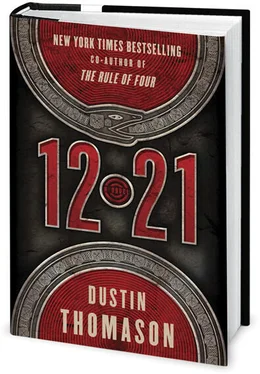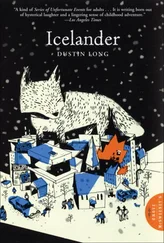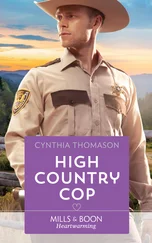Davies motioned at Thane. “Now all she has to do is inject them into her friends’ IVs and not get caught.”
Thane’s condition for participating was that the test group consist of her sick friends and colleagues from Presbyterian Hospital. She knew she was taking a risk with their lives if the antibody didn’t work. She also knew it was the only chance they had.
“How long will it be until we know something?” she asked.
“Don’t get ahead of yourself,” Stanton said. “The preparations won’t be ready for another twelve hours.”
Davies smiled. “Anyone want to go work on their tan?”
“And then?” Thane asked.
“If it works, we should see some results within a day,” Stanton said.
“And if it doesn’t?”
“Don’t know about you Yanks,” Davies said, “but if it doesn’t, I for one am going to find a way out of this godforsaken country.”
HE HAD DECIDED TO BUILD THEIR CITY IN THE VERDUGO MOUNTAINS because of its spiritual significance to the Tongva—the people of the earth—who ruled the L.A. basin for thousands of years before the arrival of the Spanish. On a twenty-acre plot, which he had convinced L.A. County to sell during the budget crisis, he and his daykeeper and their growing community of followers had quietly built fifteen small stone abodes, each capable of housing up to four members. They had won the necessary permits, befriended the regular hikers, and filed the documents of incorporation for a self-sustaining agrarian community twenty miles outside the city.
“We did this,” he’d told them just a month ago, while his daykeeper looked on with pride. “All of us. Together.” And he meant it. They had done it, even if some of the twenty-six men, women, and now two children born into the community didn’t realize their own part in the achievement. That day, a few of them had asked him to speak from the hilltop, rather than from the humble doorstep of his house. But he had just smiled. “There might be a king among us someday,” he’d told them, “but not today, and it’s certainly not me.”
Once he’d been a soldier. He’d spent most of his life in the deserts: Arizona, Kuwait, Saudi Arabia. The first time they’d sent him to Guatemala, he could barely breathe the wet air. Could barely handle being trapped beneath the teeming tree canopy that sucked up all the light. But then he had fallen in love with the place. Not with Guatemala City and its thieves and beggars; not with the soldiers he was sent to train, with their unearned swagger. He fell in love with the hidden world of the jungle.
At first, the indígenas were blurry figures on the sides of the rural roads, hardly looking up from their labor as he hurtled by in a military jeep. But then he explored the ruins of Tikal and Copan on his weekends off base. He read about the culture that survived the conquistadores and then centuries of men like him sent to destroy it. He began to understand the prophecies of their ancestors, how much they’d understood about the secret ways of the world. By the time he met the daykeeper, he knew what he had to do.
Because he had been a soldier, he understood the value of firm command, and he’d used it to bring his followers under his sway. But command could do only so much, he also knew. A soldier learned to follow his leader anywhere, at any cost. That taught men to win battles, but it did not make for enduring cultures. It did not teach habitual followers to become leaders and priests, to set the foundations of a city that would survive longer than he and the daykeeper. Their followers who pleaded with him to climb hilltops and give speeches did it because they needed orders. They needed someone to rule from above. They had built a city from scratch with their bare hands, yet they were terrified of building a civilization. They’d sacrificed so much for their beliefs—family, jobs, and more—and now a very frightening thing had happened: They’d been proven right.
He stared out the window of his little house in the mountains, maybe for the last time. After all the preparation, all the planning, these hills had turned out not to be the refuge they’d needed. Remote as it was, it was still in the quarantine zone, among the thousands dying in this city and the tens of thousands more who would be dying soon. He would have to lead his people to a place they knew only from books, and he knew not all of them would survive the journey.
He turned his eyes from the window and composed his expression so that even these senior members—the two men and one woman who now sat around this dining table—would see only inspiring certainty.
“Eighteen months of construction,” Mark Lafferty was saying. “And now we’re going to have to start all over again.”
Lafferty was a middle-aged structural engineer who’d grown up near Three Mile Island, which entitled him to a tragic outlook. He was useful, though. He’d supervised all this construction.
Instead of responding, their leader stood up with a flourish and paced the little room. They watched him appear to gather his thoughts. Sometimes it made him sad how easy it was to play on people’s desire for command. If he didn’t have the daykeeper to talk to, he’d be bored out of his mind.
“Mark,” he said, “look at the fantastic job you all did here. Imagine how much better you’ll do once you can use the original materials. Clay, wood, proper thatch. And we’ll have more room to grow down there too. Much more than we could ever have had here. Besides, look into your heart. You all know as well as I do that these hills were never quite right for us. We always needed to head south.”
He took his seat again. On the table were maps of Los Angeles, the western seaboard, and the path through Mexico into Central America. There were places along the way where Lafferty, if he became a tax on the group morale, could be left behind. Those kinds of decisions lay ahead. First came the escape—and the one task remaining before it.
He knew the next to speak would be David Sarno. Sarno had been one of their earliest recruits. He was an ex-industrial farmer who’d become disgusted with genetically modified organisms. A man who knew soil and crops, he also had an authority that could be cultivated. “Based on the average temperatures down there, we won’t have any trouble growing corn or beans, of course. Wheat may be harder, but we don’t need wheat.”
“What does the daykeeper think?” Laura Waller asked. When he had met Laura and recruited her, she was a thirty-two-year-old school-teacher, freshly divorced after four devastating failures at in vitro fertilization. Now she was thirty weeks’ pregnant with the child they had conceived naturally.
“He agrees. South is the only way.”
Lafferty spoke up again. “We need eight trucks to get everything out. How are we going to get that many trucks across the border?”
He shuffl ed the maps quietly. “We’ll get everything in four trucks at most, prioritizing seeds, medical supplies, and weapons.”
The front door opened. The daykeeper. Relief flooded the room at his safe arrival. The daykeeper meant to these people. He was warm. Kind. Compassionate about them and their lives.
“Daykeeper, come, sit. Are you thirsty?”
“I’m fine, Colton. Thank you.”
Victor wiped a bit of sweat from his brow, sat down at the table. “This might be the only peaceful part of L.A. County left,” he said.
Lafferty started to dig back into logistics, but Shetter quickly cut him off. “Thank you all for your counsel. Now would you all give me a few minutes with the daykeeper?”
Shetter kissed Laura on the cheek as she left with the others.
“Are they handling the change of plans?” Victor asked when they were alone.
Читать дальше












